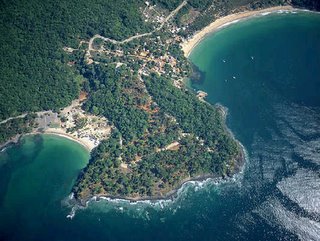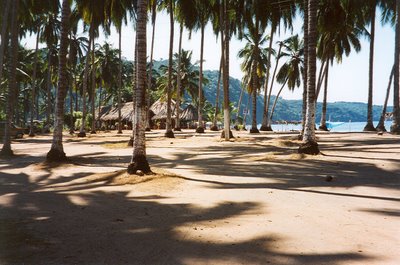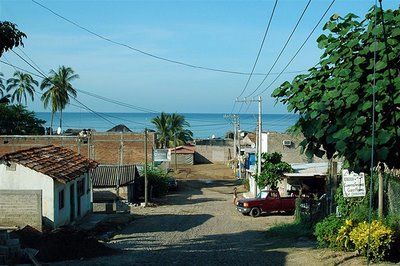
I have a few suggestions, and opinions, about buying real estate and building in the Chacala area. Or really, in Mexico. I am definitely not an expert about real estate in Chacala or anywhere else, but I do have some thoughts, or observations, on the topic, for what it’s worth.
1. Chacala is kind of different from most other towns I know of in Mexico. It is surrounded by large blocks of land (federal land and eijido) that aren’t, at this time, available to individual buyers. And another block is the gated development called the “Marina” (for some obscure reason, since there's no marina there) where the lots are very expensive.
Anyway, the federal government owns a large block of land between the beach and the paved road, and between the gateway to Majahua/Mar de Jade up to Chico’s restaurant. The Feds have apparently been trying to sell it to developers for years. The whole area, in one large block. That means more than half of land along the playa, the beach, in Chacala, is not available for individuals to buy. But it will most likely, be developed, sometime in the future.
Much of the area to the east and north of Chacala, no longer including the “Marina”(originally eijido land), is eijido land, owned communally since one of the Mexican Revolutions, by the Las Varas eijido group. I have been told that a few Chacala residents are members of that group.
About 500 small parcels, small building lots, were distributed to eijido members about seven or eight years ago. Some of those lots were re-sold to gringos, and other Mexicans. Some have been sold to visitors more recently. People who didn't know about the various complications regarding titles, building permits, and the current difficulty in getting a Bank Trust and building permits (required by law) for these lots.
At this point it is not possible to buy or sell these lots. Be careful about these lots. Some gringos and Mexicans wanting to sell their lots will tell you, "oh, no problem". But there's a big problems, so be careful.
The rest of the eijido land remains as a very large block of land, mostly to the north of Chacala, but also to the east. The little "colonia" of small vacation homes, is just east of the paved road, kind of uphill from the center of Chacala. These lots were lots from that distribution. Various eijido governments, which change every few years, have different ideas about what to do with the land, including selling it to a developer.
Apparently there are some court cases in progress about the disposition of the lots that were sold by eijido members, and on which maybe six have been built on by gringo owners. The titles for those lots seem to be pretty cloudy. And I don't think they have building permits. Maybe some do. And I don’t think anyone is selling them right now. But who knows? I hope no one is buying any of those lots until the legal issues are resolved.
In any case, with the ocean on one side, and a development with very expensive lots (the "marina"), and eijido land in legal limbo, and Federal land to the south, there aren’t many lots to be sold in Chacala, and the prices seem to be rising rapidly.
There are some lots being sold in Chacala proper, but many local people now understand about real estate prices and are holding off selling. There are some lots for sale up on the hillside to the south and the south east, back towards Las Varas, and up on the hill to the south of Chacala. Those are also expensive, small lots. And are also in the middle of complicated legal issues regarding their eijido status.
Chacala proper is a very small area, and the lots are generally very small, and built on lot-line to lot-line. There are some small, empty, infill, lots available in town. There are water lines along the street to most of the lots in Chacala proper. The water currently runs about 4-6 hours a day, and it stored at each house for household use. Phone lines are available in most of town, and probably ¾ of the houses have a formal, metered, electrical connection. No streets in Chacala itself are paved, except the road that runs from Las Varas to the “marina”. There is no sewage system in Chacala itself. Most of the houses have below ground cement/brick vaults for their waste water. I don’t know how sewage is handled in the development, the“marina”.
There is also a small development (maybe 45 acres) on the bluff on the south end of the beach. I am not sure what’s happening there. The access is from about a mile east of Chacala. No beach. It is/was also eijido land, so who knows, and is just currently installing a water system from a well about 7 miles from the develop. As of Sept 2007 I think there are two buildings being constructed up there.
2. People considering buying and or building in Chacala would do well to do lots and lots of research about owning property in Mexico. Including laws about real estate, history (de-evaluation in 1992), taxes, your legal status, medical care, banking costs and regulations, importing vehicles, importing household items, visas etc.
Banking processes are different, and are generally more expensive in Mexico. Transferring money from the U.S. can be very expensive if you or your realtor don’t know what you/they are doing. Legal protections, and the entire legal system, is different in Mexico. Being a U.S. or Canadian citizen doesn’t offer any protection, although it seems to be a common fantasy among gringos. Ignorance of Mexican law IS NOT an excuse for illegal acts.
Foreigners can not buy land within about 30 miles of Mexico's borders or the ocean.
Your options are to use a Bank Trust at a Mexican bank or to form a Mexican corporation, where a Mexican national owes either 49 or 51% of the corporation. Can't remember.
Also, if you haven't studied up on Mexican history, their last devaluation of the peso was only 15 years ago.

3. Some other thoughts. If you are thinking of living here, or visiting regularly, it’s definitely worthwhile if you go ahead and start learning Spanish. And once you find a lot, look into who your neighbors will be. For example, almost all the “marina” property owners are wealthy Mexicans, who may or may not be interested in socializing with buyers from the U.S. and Canada. Nor non-Spanish speakers.
The north end of Chacala seems to be attracting gringos: I think there are currently maybe 8 gringo-owned buildings or lots in that end of town. That maybe appealing to you, or it may not.
"Corruption" (otherwise known as income redistribution) in Mexico seems to be different than in the U.S.. In the U.S. I think most of the corruption is by the wealthy and highly placed political and business leaders. In Mexico it’s at every level, and much more open. It’s a different way of doing business. And you need to learn that system. The U.S. rules and customs do not apply. Always remember that the rules are different in Mexico, and it’s up to you to figure out what they are. Social customs are different too. The phrase "Mexican Time" exists because it's real and impacts how business and social life happens here.
Don’t assume you understand what’s going on. Ask questions. Get an independent translator to help you if necessary. And don’t hire the realtor’s cousin or friend or whatever.
4. Find a realtor who is recommended by someone you really trust. Anyone can sell property in Mexico. They are no rules. Look for someone who is affiliated with Realtors who have been in business in this area for more than a year or two. The laws of Mexico regarding property ownership are complex are are all the laws and regulations regarding buying and selling property here. People trying to sell real estate in Mexico often seem to misrepresent themselves.
Speaking English may or may not be a good predictor of quality real estate work.Choosing a realtor is a “buyer beware” situation in Mexico. Be sure to find out if the person selling a home or lot to you has lots of experience in Mexico. Look for someone with the skills and knowledge they need to successfully complete legal real estate contracts in Mexico. Ask specific questions about their experience and background. Ask about who they work with to complete all the legal work, and find out what they think the timeline with be for completing a sale.
5. It might be a good idea to get references and find out how long your potential realtor has been selling real estate in Mexico, and how many transactions they have successfully closed.
Satisfied customers are probably the best recommendation. But sometimes the problems that come from incompetence in real estate transactions don’t show up for years. It’s a tricky business. Someone affiliated with a real estate agency is probably a good recommendation..
But remember that an agency having a familiar name, like “Century 21”, or "Prudential" or whatever, is not protection from malfeasance and errors. The name usually just means the agency paid to use that name. It's not even a franchise. If you get into a bad situation with one of these agencies there is no one to help you make things right. The local P.V. and Guadalajara papers discuss these kinds of situations regularly.
6. And the same holds for hiring a builder or contractor. Look for someone with experience in building in Chacala, or at least in Nayarit. And look for someone who has completed buildings that you can inspect. Hopefully buildings that were completed at least several years ago and have made it through a couple of rainy seasons. Again, speaking English is helpful, but having solid contracting and construction skills and a good relationship with local people, including officials maybe what really counts.
If your contractor doesn't pay all the very complicated payments regarding his employees, the government will come after you when then find out. And it could be years later. That's one of the reason is good to choose a contractor with a long track record.
I also have a strong opinion against allowing the builder to design the building. There are some pretty ugly buildings with structural problems in this area that were built without the help of an architect/engineer.
Hiring someone with experience in this climate and with local construction methods makes the most sense to me. And watch out for lot-line issues. And water drainage issues. Right now, when someone builds on a lot in Chacala with large rocks, they tend to bulldoze them onto the next lot. And if there are serious water drainage issues (during the rainy season), a typical solution it to add dirt fill to your lot, so the water goes unto someone else’s lot. You need to look around and figure out if the lot you are looking are has drainage problems.
This climate requires serious attention to keeping the sun and rain out of the house, and letting the natural light and breezes in. Cross ventilation is a necessary. Unless you are planning to live in an air conditioned tomb. No breezes, no birds singing, no sound of the waves. Outside covered patios are important, and also require protection from the sun and rain. And to allow natural light and breezes into the patios. Houses need to be oriented to the sun, with an awareness of how and where the sun will enter the house during different seasons. The designer should be aware of the prevailing winds and breezes, in order to cool the house naturally.
Chacala is very humid for abut half the year. Bathrooms must have adequate natural ventilation. Not the typical 8"X8" screened hole in the upper wall that is typical here. Bathrooms need natural light in addition to adequate ventilation. Nothing like a mold, damp, smelly bathroom to make your home pleasant. Storage for clothing and linen also need to have access to fresh air and protection from rain and sunlight. Clothes in closets in the summer get mildewy very quickly.
7. I think the bottom line is, don’t leave your brains at home when you are looking into buying real estate in Mexico. Be just as careful as you would be buying property in the U.S. or Canada. Real estate agents, used car salesmen, and lawyers are the same everywhere. Be careful. You wouldn’t make a deal in the U.S,. (I hope) when you didn’t understand what other people were saying to you, nor would you sign papers you couldn’t understand, and you shouldn’t don’t do it here. It’s a tricky business, and it may be hard to tell who to trust.
Do your research. Make sure you understand what you are actually buying, and what your rights are. And about what the taxes are, and how they are paid. And how to set up a bank account, and how to get your visa. And how to get a bank trust, and what it will cost you in the long run. And what you will do if there are problems with your bank. What the situation is with electrical , water, and phone/internet connections, etc. And who pays for what, and what kind of commissions are being paid, and to whom.
It is not rude to make sure you understand what you are getting into, and what it will cost. It’s smart. And if you don’t speak English or understand the system, you are going to have to put your trust and your money some someone’s else’s hands. So make sure you choose carefully who will handle your real estate transactions.
It seems that people have had a variety of experiences with local builders (from Chacala, Las Varas, and Nayarit mostly). I think references from satisfied customers really matters with builders. Builders with a proven track record. Because if you inspect a building that has been standing for three or four years, you can see how successful the builder was. And how well they did at following up on any problems. And if the proper payments have not been made for employees, or the proper permits obtained, you are responsible. And the government may not catch you until years later.
Just my opinion, obviously.
 CAMPING ON PLAYA CHACALA
CAMPING ON PLAYA CHACALA There are different ways to stay in Chacala: beach camping, RV "camping", inexpensive Techo de Mexico family-owned rooms with or without kitchens and patios, family owned mini-complexes with four-six units, small hotels with spas, and other small rentals in varying price ranges. Some with pools. A few with air-con.
There are different ways to stay in Chacala: beach camping, RV "camping", inexpensive Techo de Mexico family-owned rooms with or without kitchens and patios, family owned mini-complexes with four-six units, small hotels with spas, and other small rentals in varying price ranges. Some with pools. A few with air-con. Esparanza's is my favorite camping area. Partly because she has lots of palm trees and its cool and shady, and its the last ramada area on the beach, going south. Don Beto and Dona Lupe have a nice camping area next door.
Esparanza's is my favorite camping area. Partly because she has lots of palm trees and its cool and shady, and its the last ramada area on the beach, going south. Don Beto and Dona Lupe have a nice camping area next door. Some people camp on the beach below the high tide line (and pay at the campgrounds to use the toilets, etc). Often you see people suddenly realizing their tent/camp is about to be swamped by the rising tide, and hurrying to move everything out of the way. There are a few places to park along the beach road where it is quieter and nicer. A person might want to talk to someone at the nearest house and work out an arrangement about parking/camping there. It is worth talking to several people to make sure you are paying the appropriate person for your spot.
Some people camp on the beach below the high tide line (and pay at the campgrounds to use the toilets, etc). Often you see people suddenly realizing their tent/camp is about to be swamped by the rising tide, and hurrying to move everything out of the way. There are a few places to park along the beach road where it is quieter and nicer. A person might want to talk to someone at the nearest house and work out an arrangement about parking/camping there. It is worth talking to several people to make sure you are paying the appropriate person for your spot. In January and February this lovely spot is filled with motor homes
In January and February this lovely spot is filled with motor homes













